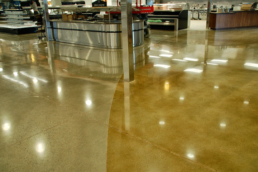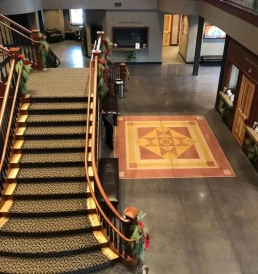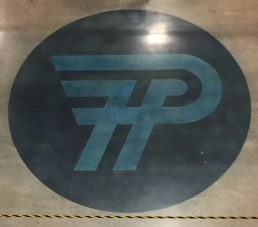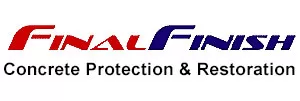Polished Concrete Floors
Commercial concrete polishing and densifying for large warehouses, big box stores, supermarkets, retail shops, car dealerships, and more.
With over 20 years of experience coupled with state-of-the-art equipment and industry-best sealing products, Final Finish is the smart choice for your concrete polishing project.
Our concrete polishing process ensures minimal downtime for your facility and floors can be used hours after the last application is completed. Our water-free grinding process uses a dust extraction system, eliminating 98% of the airborne particles. Our hardener/densifier is VOC-compliant, odorless, and environmentally safe.
Industries and markets served
-
- Warehouses of all sizes
- Healthcare Facilities
- Restaurants & Bars
- Retail Chains
- Office Buildings
- Retail Outlets
- Educational Facilities
- Hotels and Hospitality
- Government Buildings
- Shopping Centers & Malls
- Super Markets/Grocery stores

Specialty polished concrete floors
At FinalFinish, we understand that your company may have specific requirements when it comes to colors and finishing touches. That’s why we offer a range of options, including stains, dyes, and specialized polishing services. As a certified applicator, we work with top-quality products to ensure the best results. Some of the products we use include Ameripolish Dye, L&M Chemical’s FGS/Permashine, Prosoco by Consolideck, Rapid Set TRU PC Self Leveling Overlay System, and RetroPlate System. These products are known for their durability and ability to enhance the appearance of your surfaces. With FinalFinish, you can expect a professional and flawless finish every time.
We have the knowledge and experience to create custom polished concrete floors. Stained, designed, and logo-imprinted polished concrete floors present an opportunity to transform a basic concrete floor into a personalized and aesthetically pleasing surface. This approach to flooring is becoming increasingly popular due to its durability, cost-effectiveness, and virtually limitless design potential.
Concrete Staining: Concrete staining is a process that infuses the concrete with rich, long-lasting color. There are generally two types of stains: acid-based and water-based. Acid-based stains react chemically with the concrete to create natural, earthy tones and a unique, mottled appearance. Water-based stains, on the other hand, penetrate the concrete and provide more vibrant and consistent colors. These stains are permanent and won’t fade, peel, or chip away over time.
Designs in Concrete: Decorative designs can be incorporated into the concrete through techniques such as scoring, engraving, and stenciling. This allows for the creation of intricate patterns, shapes, and even images. The designs can be as simple as geometric shapes or as complex as detailed graphic images, providing a high degree of customization to match any decor style.
Logo Imprinting: For businesses looking to make a strong visual impact, logos can be imprinted onto the concrete floor. This is typically achieved by creating a stencil of the logo and applying it to the concrete before staining. Once the stain is applied, the stencil is removed, revealing the logo in the original color of the concrete. This creates a striking contrast and serves as a unique branding opportunity. The complexity of the logo design can range from simple text to intricate multi-color designs.
Polishing: After staining and adding designs or logos, the concrete is then polished. The polishing process involves grinding the surface of the concrete with machines equipped with diamond-segmented abrasives. The process is repeated with finer grits until the desired level of shine and smoothness is achieved. Polishing not only enhances the look of the stained concrete and designs, but it also increases the floor’s durability and reduces maintenance needs.
Stained, designed, and logo-imprinted polished concrete floors offer a durable, cost-effective, and highly customizable flooring option. With the right planning and professional execution, these floors can become a focal point of any space.



Benefits of polished concrete floors
Used in commercial and industrial settings, concrete polishing can be done on both old and new concrete surfaces. It offers many benefits, including improved durability, reduced maintenance costs, and enhanced appearance.
Commercial concrete polishing offers a number of benefits, including:
-
- Increased durability: Polished concrete surfaces are extremely durable and resistant to damage from heavy foot traffic, forklifts, and other machinery.
- Lower maintenance costs: Polished concrete requires minimal maintenance, as it is resistant to stains and scratches. This can help lower maintenance costs and increase the lifespan of the surface.
- Improved appearance: Polished concrete has a smooth and glossy surface that can enhance the overall appearance of a commercial space.
- Increased safety: Polished concrete surfaces are less slippery than unpolished concrete, reducing the risk of slips and falls.
- Environmental benefits: Polished concrete is a sustainable option, as it eliminates the need for coatings or other materials that can have negative environmental impacts.
- Cost-effective: Polished concrete is a cost-effective option for commercial spaces, as it eliminates the need for expensive coatings or coverings.
- Reflectivity: The reflective nature of polished concrete surfaces can help increase natural light in a space, reducing the need for artificial lighting and lowering energy costs.
These benefits make commercial concrete polishing an attractive option for a variety of commercial spaces, including retail stores, warehouses, and office buildings.
At Finalfinish, we specialize in providing the specific product that architects specify for densifying and sealing projects. As certified applicators, we offer a range of hardener/densifiers from reputable brands such as Ashford Formula by Curecrete Chemical Company, Diamond Hard by Euclid Chemical, Seal Hard by L&M Chemical, Lapidolith by Sonneborn, and Consolidec by Prosoco. Rest assured that we have the expertise to deliver the high-quality results for your projects.
Concrete polishing process
Concrete polishing is a process that involves mechanically grinding, honing, and polishing concrete surfaces to create a smooth, glossy finish. The process is typically carried out using diamond polishing pads that gradually increase in fineness to create a polished surface. The result is a durable, low-maintenance surface that is ideal for high-traffic areas such as retail stores, office buildings, and warehouses.
The concrete polishing process typically involves the following steps:
-
- Preparation: This involves cleaning the surface to remove any dirt, debris, or other contaminants that may be present. Any existing coatings or sealers may also need to be removed before polishing can begin.
- Grinding: The surface is ground using progressively finer diamond abrasive pads until the desired level of smoothness is achieved. This can take several passes with different grits of diamond pads.
- Honing: Once the surface is ground, it is honed using finer diamond abrasive pads to create a smooth, even surface.
- Polishing: The surface is polished using even finer diamond abrasive pads until it achieves the desired level of gloss and shine.
- Sealing: The surface may be sealed with a penetrating sealer to protect it from stains and wear.
Polished concrete floor maintenance
Maintaining polished concrete floors is important to ensure their longevity and to keep them looking their best. Here are some tips for maintaining polished concrete:
-
- Clean spills promptly: Spills should be wiped up as soon as possible to prevent staining or etching on the surface.
- Sweep or dust mop daily: Regular sweeping or dust mopping will prevent dirt and debris from scratching the surface of the polished concrete.
- Damp mop regularly: Use a damp mop to clean the floor regularly, using a neutral pH cleaner designed for polished concrete.
- Use mats or rugs: Placing mats or rugs at entrances will help prevent dirt and debris from being tracked onto the polished concrete surface.
- Avoid using harsh chemicals: Avoid using acidic or alkaline cleaners, as these can damage the surface of the polished concrete.
- Reapply sealer periodically: The sealer on a polished concrete floor will wear down over time, so it is important to periodically reapply a sealer to protect the surface.
By following these maintenance tips, you can help extend the life of your polished concrete floors and keep them looking their best.
Commercial polished concrete floors offer a winning combination of durability, aesthetics, low maintenance, and cost-effectiveness. Their ability to withstand heavy foot traffic, customizable design options, and long lifespan make them an ideal flooring choice for a wide range of commercial settings. From offices and retail stores to restaurants and showrooms, polished concrete floors provide businesses with a versatile and visually appealing solution that enhances the overall atmosphere and promotes a positive impression among employees, customers, and clients alike.
